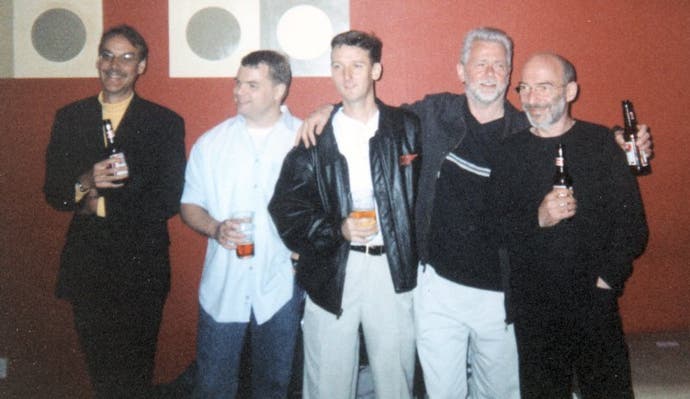Fred Gray on C64 Music
Best SID down for this one.
Aurally, there wasn't much to write home about during the 8-bit home computer era. Games burped and belched to accompany in-game action and that was about it. Early ZX Spectrum attempts at music were painful, and, when amplified using the EAR lead, sent pets running for cover. Early attempts on the C64 didn't do much better.
It was only towards the end of short, sharp development that the bedroom coder considered sound effects. Music was often out of the question. So it took a special kind of person to transition from pixel-by-pixel 8-bit game development to notes, quavers and synthesised drumbeats. These individuals, technically adept at programming low-level machine code and gifted with a good ear for a catchy melody, took a while to arrive, but a number of names spring to mind - Rob Hubbard, Martin Galway, David Whittaker and Fred Gray, for instance.
Chris Abbott, meanwhile, continues to keep C64 music alive with, appropriately, live events called "Back In Time", which celebrate classic SID tunes with modern remixes. Tracks like Spellbound, Parallax and Comic Bakery have never sounded so good - a testament to the underlying quality and longevity of the compositions. Elsewhere, Chris' website celebrates the tunes further, with any proceeds going back to the original authors, and a quick browse is worthwhile if you've never been there.
But enough preamble. In this, the first in a series of interviews, we talk to Fred Gray about the games he worked on, attitudes now and at the time and links to other prominent C64 composers.
I got into programming computers through a friend called Vic [the Vic 20]. Wrote a few games for it and submitted them to a friend - the flesh and blood kind - Tim Best, just as he was taken on as recruitment manager for Imagine. Tim loved the music I managed to get out of the Vic 20 and made me in-house musician - a job title that never existed before as far as I am aware. The rest is history.
I did win an award for a tune I arranged for the Spectrum - a reggae version of Jerusalem.
To me it was a job - but the fans were just teenagers at that time and it is carved into their hearts and souls. The more C64 fans I meet the more I see it as a huge family. It is really nice that some write their own music or covers of SID chip classics. The BIT phenomenon came about out of a great need and I think Chris Abbott does a fantastic job at trying to reunite fans and musicians. In fact it is great that the musicians finally got a chance to meet - I found them all to be really great guys - modest yet so talented who each do their fans a great justice.

Some of my early stuff, as raw as it was, was really popular - Shadowfire, Enigma Force etc. The music I started writing for Psyclapse - a bouncy 12/8 number - had a raw power that impressed the bosses at Imagine - I used to get my inspiration from kids' TV show themes.
Mutants is an obvious choice - especially the unsung high score tune - but Madballs I love also, especially as the software house that took it loathed it. Somebody did a hilarious cover with speech samples.
When I usually fell asleep at the keyboard! I would work all night and sleep in the day - became the end of me in the end. Creative people fall into the nocturnal trap so easily. I would wake in the afternoon and play it back and decide if it needed more work or sometimes, if I hated a piece, I would just say to myself "what the hell - that will do!"
My personal limitation was my software. Rob Hubbard wrote the most amazing software as well as music - combined they made for an amazingly original and energetic sound. He used Multiplexing which gave great drum sounds - sounds I never mastered.
I had a cheap synth which I used to dream up melodies but I would start work on the backing first as that was the backbone and driving force. I would mess about on the synth with one hand while assembling one tune and new tunes would pop into my fingers (not my head) as I messed about the synth. Enigma Force was a classic example of that - "Where the hell did that come from?" was what I thought when I first played it! It was that simple - although on Mutants I remember swapping the bass line with the melody in places - such an inspired move it turned out to be!







